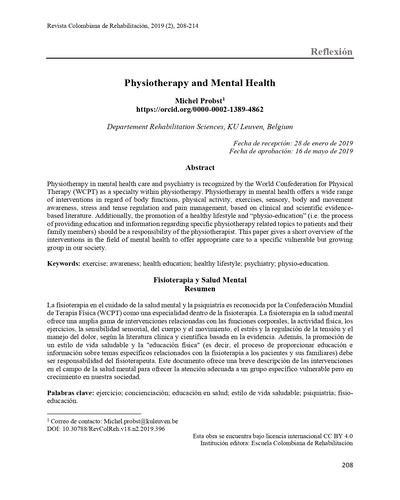Physiotherapy and Mental Health
Contenido principal del artículo
Autores
Michel ProbstMichel.probst@kuleuven.be
Resumen
La fisioterapia en el cuidado de la salud mental y la psiquiatría es reconocida por la Confederación Mundial de Terapia Física (WCPT) como una especialidad dentro de la fisioterapia. La fisioterapia en la salud mental ofrece una amplia gama de intervenciones relacionadas con las funciones corporales, la actividad física, los ejercicios, la sensibilidad sensorial, del cuerpo y el movimiento, el estrés y la regulación de la tensión y el manejo del dolor, según la literatura clínica y científica basada en la evidencia. Además, la promoción de un estilo de vida saludable y la "educación física" (es decir, el proceso de proporcionar educación e información sobre temas específicos relacionados con la fisioterapia a los pacientes y sus familiares) debe ser responsabilidad del fisioterapeuta. Este documento ofrece una breve descripción de las intervenciones en el campo de la salud mental para ofrecer la atención adecuada a un grupo específico vulnerable pero en crecimiento en nuestra sociedad.
Detalles del artículo
Licencia
Aquellos autores/as que tengan publicaciones con esta revista, aceptan los términos siguientes:
- Los autores/as conservarán sus derechos de autor y garantizarán a la revista el derecho de primera publicación de su obra, el cuál estará simultáneamente sujeto a la Licencia de reconocimiento de Creative Commons que permite a terceros compartir la obra siempre que se indique su autor y su primera publicación esta revista.
- Los autores/as podrán adoptar otros acuerdos de licencia no exclusiva de distribución de la versión de la obra publicada (p. ej.: depositarla en un archivo telemático institucional o publicarla en un volumen monográfico) siempre que se indique la publicación inicial en esta revista.
- Se permite y recomienda a los autores/as difundir su obra a través de Internet (p. ej.: en archivos telemáticos institucionales o en su página web) antes y durante el proceso de envío, lo cual puede producir intercambios interesantes y aumentar las citas de la obra publicada. (Véase El efecto del acceso abierto).
Los autores que publican en la revista se acogen al código de licencia de Creative Commons Atribución 4.0 Internacional (CC BY 4.0)




Referencias
Calsius, J., De Bie, J., Hertogen, R. & Meesen, R. (2016). Touching the lived body in patients with medically unexplained symptoms. How an integration of hands-on bodywork and body awareness in psychotherapy may help people with alexithymia. Frontiers in Psychology, 253, 1-11. doi: 10.3389/fpsyg.2016.00253
Connaughton, J., & Gibson, W. (2016). Physiotherapy Students' Attitudes toward Psychiatry and Mental Health: A Cross-Sectional Study. Physiotherapy Canada, 68(2), 172–178. doi:10.3138/ptc.2015-18E
Donaghy, M., Nicol, M. & Davidson, K.M. (2008) Cognitive Behavioural Interventions in Physiotherapy and Occupational Therapy. London: Butterworth-Heineman.
Everett, T., Donaghy, M. & Fever, S. (2003) Interventions for mental health: an evidence based approach for physiotherapists and occupational therapists. Edingburgh, Scotland: Butterwood Heinemann.
Fogel, A. (2009). The psychophysiology of self-awareness: rediscovering the lost art of body sense. New York, USA: W.W. Norton.
Mehling, W.E., et al. (2011). Body Awareness: a phenomenological inquiry into the common ground of mind-body therapies. Philos Ethics Humanit Med. 2011;6: 6. doi: 10.1186/1747-5341-6-6.
Mehling, W. E., Wrubel, J., Daubenmier, J. J., Price, C. J., Kerr, C. E., Silow, T., … Stewart, A. L. (2011). Body Awareness: a phenomenological inquiry into the common ground of mind-body therapies. Philosophy, ethics, and humanities in medicine : PEHM, 6, 6. doi:10.1186/1747-5341-6-6
Payne, R. (2005). Payne's Handbook of Relaxation Techniques. 4th Edition. A Practical Guide for the Health Care Professional. London: Churchill Livingstone.
Porter S. (2017). Psychologically informed physiotherapy. Elsevier: London.
Pötz, H. (2009). Professionelle Distanz nützt Therapeut und Patient. Physiopraxus 7, 52-54. Doi: 10.1055/s-0032-1308304
Probst, M. & Peuskens, J. (2010). Attitudes of Flemish physiotherapy students towards mental health and psychiatry. Physiotherapy, 96, 44-51. doi: 10.1016/j.physio.2009.08.006.
Probst, M, (2012) The International Organization of Physical Therapists working in Mental Health (IOPTMH). Mental Health and Physical Activity, 5 (1), 20-21. Doi: 10.1016/j.mhpa.2012.04.003
Probst, M., Skjaerven, L.H., Parker, A., Gyllensten, A.L., IJntema, R. & Catalán-Matamoros, D. (March, 2016). Do you support this definition of physiotherapy in mental health? In 6th International Conference on Physiotherapy in Psychiatry and Mental Health [Abstract 117], Madrid, España.https://doi.org/10.1016/j.ft.2016.04.002
Probst, M (2017). Physiotherapy in mental health. In: T. Suzuki (Ed), Clinical physical therapy. Zagreb: Intech. InTech, Retrieved from: http://www.intechopen.com/books/
Probst, M. & Skjaerven L. (2018). Physiotherapy in Mental Health and psychiatry: a scientific and clinical based approach. London: Elsevier.
Probst, M. (2018). Physiotherapy in mental health: an historical overview. Sjukkrabjalfarinn (Icelandic physiotherapy journal), 46(2), 10-12. Retrieved from: https://limo.libis.be/primoexplore/fulldisplay?docid=LIRIAS2338789&context=L&vid=Lirias&search_scope=Lirias&tab=default_ta b&lang=en_US&fromSitemap=1
Rovner, G. & Skinta, M.D. (2018). Acceptance and commitment therapy in physiotherapy. In: Probst M, Skjaerven L. (Eds). Physiotherapy in Mental Health and psychiatry: a scientific and clinical basedapproach. (pp. 36-49) London: Elsevier.
Schwank, A. & Brunner, E. (2016). Attitudes towards psychiatry of physiotherapy students from Germanspeaking countries: an international comparison. In 6th International Conference on Physiotherapy in Psychiatry and Mental Health [Abstract 91], Madrid, España. https://doi.org/10.1016/j.ft.2016.04.002
Skjaerven, L. (2013). Basic body awareness therapy. Promoting movement quality and health for daily life. Bergen: Hogeskolen.
Skjaerven, L.H., Mattsson, M., Catalan-Matamoros, D., Parker, A., Gard, G., & Gyllensten, A.L. (2018). Consensus on core phenomena and statements describing Basic Body Awareness Therapy within the movement awareness domain in physiotherapy. Physiotherapy Theory and Practice, 26, 1-14. doi:10.1080/09593985.2018.1434578.
Staub, C. (2019). Factsheet neurophysiology: physiotherapy and psyche. Retrieved from: www.Physiofuture.ch
Stewart, A., Laasko, L., & Connaughton, J. (2016). Attitudes of quensland physiotherapists toward psychiatry. In 6th International Conference on Physiotherapy in Psychiatry and Mental Health [Abstract 7], Madrid, España. https://doi.org/10.1016/j.ft.2016.04.002
Stubbs, B. & Rosenbaum, S. (2018). Exercise based interventions for mental illness. London: Elsevier.
Thornquist, E., & Bunkan, B.H (1991).What is psychomotor therapy? Oslo: Norwegian university press.
World Health Organization (2010). Global strategy on diet, physical activity and health. Geneva, Switzerland: WHO. Retrieved from: www.who.int/dietphysicalactivity/pa/en/index.html
Yucel, H. & Acar, G. (2016). Levels of empathy among undergraduate physiotherapy students: A cross-sectional study at two universities in Istanbul. Pak J Med Sci. 32(1):85-90. doi: 10.12669/pjms.321.8745.


 PDF (English)
PDF (English)










